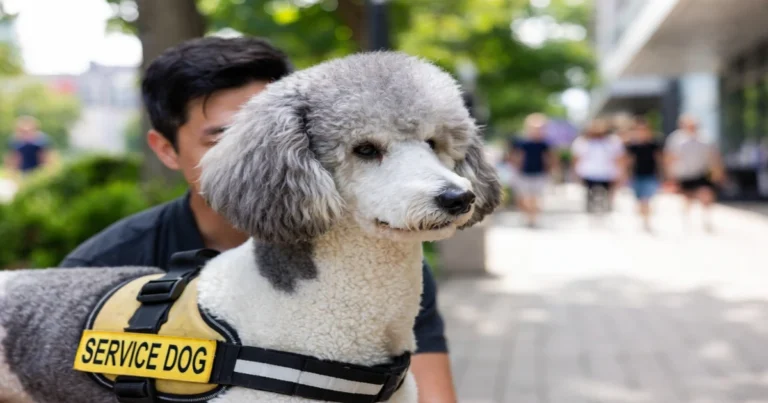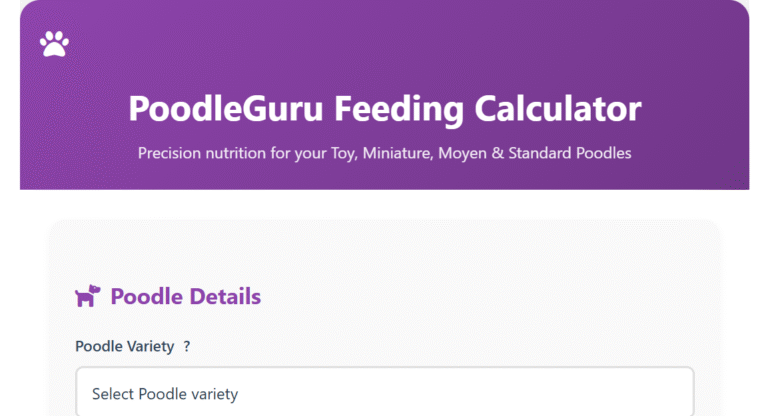A poodle golden retriever mix would be more commonly referred to as a crossbreed dog, specifically a Goldendoodle. Goldendoodles combine the sociable, easy-going nature of golden retrievers with the intelligence and hypoallergenic coat of poodles.
Most Goldendoodles only range in height from 20 to 24 inches and have an average adult weight of 50 to 75 pounds. America’s Goldendoodles adapt well to life in high-rises and farmhouses alike.
They’re beloved for their beautiful coats, playfulness, and temperament with children and other animals. Most owners choose this mix to get a dog that sheds little while having the exact affectionate nature as their companion.
Here’s what you should know before adopting your new Goldendoodle, plus everyday care tips to get you started.
What Exactly is a Goldendoodle?

A crossbreed, the Goldendoodle combines the brains of a Poodle. It highlights the loyal steadiness of a Golden Retriever. In the 1990s, this crossbred mix became a hit in the United States and Australia.
It was meant for those of us looking for a dog with the low-shedding, allergy-friendly coat and the friendly, people-loving temperament. Goldendoodles are designer dogs—this is the term given to a crossbreed created by intentionally crossing two purebreds.
They come in three sizes, shaped by the Poodle parent: toy, mini, or standard. Their coats can be wavy, curly, or straight, displaying anything from corkscrew curls to beachy waves.
Goldendoodles are the perfect family dog. Their friendly, even-tempered disposition and low-maintenance temperament blend well into virtually any home. Today, many dream of them for their affectionate temperament and boundless energy.
A Goldendoodle’s temperament tends to do well with children and other animals. The breed exhibits what’s known as “hybrid vigor,” so they’re less likely to suffer from health problems that purebreds are prone to.
The Poodle Parent: Smart & Stylish
Poodles are very smart and eager to learn new things. They’re famous for their stylish, curly coats, which can be more tolerable for allergy-sufferers. You’ll see Poodles frequently in dog sports.
Their quick athletic build and drive to please personality ensure their versatility and trainability!
The Golden Retriever Parent: Loyal & Loving
Golden Retrievers are well known across the world for their loyal, gentle demeanor. Families love them for their patience around kids and even-tempered spirit.
Their high retriever instincts help them shine as service and therapy dogs. Their golden coats have a warm, classic beauty.
The Wonderful Blend: Best of Both
Goldendoodles combine intelligent, hypoallergenic qualities with a sweet-natured, laidback temperament. As for their coats, Goldendoodles can have a variety of coat types and colors.
Their cheerful, even temperament suits both active households and more laid-back environments. Lovable and versatile, they are perfect for almost any environment.
Goldendoodle Unpacked: Traits & Temperament

The Goldendoodle, the cross between a Poodle and Golden Retriever, is famous for combining the best of both breeds. These dogs are irresistible with their laidback personalities, intelligence, and deep affection for humans. They are gentle, patient, and imbued with warmth. This quality makes them the number one choice for families—even those with small children.
Their nature is shaped by their parents’ traits, early training, and how much time they spend with people and pets. Here’s a look at their differences.
1. Decoding Their Unique “Doodle” Personality
Goldendoodles tend to be happy and full of life. This is why many owners report that their Goldendoodles act like clowns and make everyone laugh with their goofy behaviors.
Though they adapt easily to active and more relaxed households alike, these dogs absolutely crave companionship. This means that leaving them alone for extended periods can result in nuisance behaviors like barking or chewing.
2. Coat Variations: From Wavy to Curly
| Coat Type | Shedding | Grooming Needs | Look |
|---|---|---|---|
| Wavy | Low | Moderate | Soft, tousled |
| Curly | Very low | High | Tight curls |
| Straight | Moderate | Low | Flat, sleek |
These coats are lower-shedding, making them a boon for homes sensitive to allergens. This means that curly coats need to be trimmed more often and brushed more frequently.
Straight coats, by comparison, are simpler to maintain but they tend to shed slightly more. It’s good to be aware of these traits before choosing a puppy.
3. Size Guide: Standard, Medium, and Mini
| Size | Weight (lbs) | Height (inches) |
|---|---|---|
| Mini | 15–30 | 13–17 |
| Medium | 30–45 | 17–20 |
| Standard | 45–90 | 20–24 |
Smaller doodles, like mini goldendoodles, are well suited to city life and apartments, while larger types will require more space and physical activity.
4. Energy & Playfulness: What to Expect
These dogs require regular walks, a game of fetch, or play sessions. Puzzle toys and games are great ways to entertain their sharp minds, too.
Without sufficient exercise, they become bored and can be destructive.
5. The “Hypoallergenic” Question: My Honest Take
Goldendoodles are better for allergy sufferers, but no dog is 100% hypoallergenic. Coat type and then your own reaction, of course, is the key variable at play.
So it’s always good to get some time with a doodle before you make up your mind.
Daily Life with Your Goldendoodle

Goldendoodles are a bundle of energy and joy to any home, making them an excellent family dog. Their combination of Poodle intelligence and Golden Retriever sociability means they thrive on consistent structure and loads of stimulation, including daily exercise and training.
Smart Pup Smarts: Training Tips
Start training on the first day. Goldendoodles are quick learners and thrive with short, positive sessions, with lots of treats and praise when they get it right. Make commands easy and practice them over and over in every room and scenario.
Early socialization, such as walks in active parks or playtime in puppy classes, creates a wonderful foundation for a calm, friendly temperament. These smart pups excel when training sessions are short, regular, reliable, and full of patience.
Exercise Essentials for a Happy Doodle
- Brisk walks (30–60 minutes daily)
- Fetch games in the yard or park
- Agility courses for mind and body challenge
- Indoor play with puzzle toys
Without sufficient exercise, Goldendoodles are prone to becoming destructive due to boredom. It’s a great way to form a bond of trust with your doodle while ensuring he stays active.
With time, consider modifying routines as dog ages/slows down.
Home Life: Adapting to Your Space
Whether you live in an apartment or a house, Goldendoodles will do just fine, provided you have the space for them to stretch out and explore. Make space escape-proof with solid fencing.
Set up a comfortable place with a cushy bed or a soft blanket so your pup can relax. Their medium size, ranging from 13 to 24 inches tall, gives them versatility for living in the city or suburbs.
Fueling Fun: Goldendoodle Nutrition Basics
Provide high-quality premium dry or wet dog food for your goldendoodles love. Maintain a consistent feeding schedule and monitor body condition score to prevent obesity in these adorable pups. Treats are great for positive training reinforcement, but keep them to a minimum.
Socialization: Building a Confident Companion
Introduce them to new people and pets regularly. Puppy playdates and visits to the dog park once they’re fully vaccinated make for great safe socialization.
When Goldendoodles are well socialized, they tend to be less anxious and more adaptable.
Goldendoodle Grooming & Health Focus
Not only is their coat beautiful, but it requires a high level of maintenance. This combination of poodle and golden retriever genetics produces some interesting variability in coat texture. It varies from straight and wavy to very tight curls!
With this variety comes a unique pet for you, but it creates a challenge when determining a grooming routine – one that varies from pooch to pooch. Proper grooming not only keeps your Goldendoodle looking great, it also prevents matting, promotes skin health, and minimizes shedding.
Most owners in the U.S. Find that taking them to a professional groomer once every 6 to 8 weeks gives the best results. Costs may be much higher based on the age of the dog and where you live.
Keeping That Coat Gorgeous: Grooming Needs
- Slicker brush
- Steel comb
- Detangler spray
- Grooming clippers
- Nail trimmer
- Ear cleaner
Curly coats require frequent grooming to prevent matting and tangles. Wavy or straight coats might suffice with brushing several times a week. To manage curls, use a slicker brush first and finish up with a steel comb.
Baths on a monthly basis, or every other month, will keep their skin and hair clean. Regular nail trimming and ear cleaning are essential to prevent ear infections, so keep those up.
Potential Health Concerns to Know
Goldendoodles are prone to hip dysplasia, allergies, and patella luxation (joint issues). Routine veterinary care, including annual dental X-rays, will ensure that they are caught early and treated appropriately.
Health concerns genetic testing, when focused and purposeful, can identify health risks. Ethical breeders will implement a health screening plan to reduce the risk of these conditions.
Vet Visits: A Lifelong Partnership
Building a relationship with a vet you can trust will go a long way. Stay current on vaccinations, flea medications, and heartworm testing. Have an honest discussion with your vet about nutrition and exercise.
Maintain a health record folder—keeping a running tab of progress and changes in health conditions over time.
My View: Proactive Health for Doodles
Preventive care is the best care—help your doodle stay active with daily walks, nutritious food, and routine dental checkups. Keep an eye out for limping or changes in behavior, because these can indicate something’s wrong.
Proactive health care measures how to keep your Doodle happy and healthy with a little daily care.
Mini Doodles & Mini Goldens Explained

Mini Goldendoodles and mini Golden Retrievers are two such breeds that have been gaining a tremendous amount of popularity as of late. These little friends provide families with an immensely popular way to experience the characteristics of Golden Retrievers and Poodles. They accomplish all those things in a smaller package too!
Nobody is shocked by their booming popularity! This is particularly important for urbanites or those looking for a dog that easily adapts to life today. Even though both breeds have many things in common, such as friendly dispositions and cute appearances, each has their own unique strengths.
Understanding the Mini Goldendoodle
Hi my name is Joyce, and I’m here to help you today. We hope the information provided on mini Goldendoodles has been helpful to you. These dogs typically measure about 15 – 20 inches tall at the shoulder and weigh around 25 – 35 pounds.
They carry the same playful, loving disposition as the standard Goldendoodle. Mini Goldendoodles usually have wavy or curly hair, requiring grooming every few months and regular brushing to prevent tangles. They do well in more compact living situations, such as apartments, as long as they receive regular walks and time to socialize.
With the proper care, mini goldens are known to live anywhere from 10 to 15 years. By adulthood, they tend to require a minimum of two hours of vigorous outdoor exercise per day.
What About Mini Golden Retrievers?
Mini Golden Retrievers are literally bred to produce dogs who resemble and behave like full-sized Golden Retrievers, only smaller. They retain the extremely people-oriented temperament that has made Goldens one of the most popular family dogs.
They require the same grooming and exercise as their full-sized cousins. These cuties require lots of grooming and exercise, too! Their compact size and devoted demeanor are responsible for shoring up their popularity among dog lovers—as are the Mini Goldens hitting shelters and rescuers.
Choosing Between These Smaller Friends
| Trait | Mini Goldendoodle | Mini Golden Retriever |
|---|---|---|
| Size | 25–35 lbs, 15–20 in. | Varies, usually under 45 lbs |
| Temperament | Playful, affectionate | Friendly, loyal |
| Grooming | High, non-shedding possible | Moderate, sheds |
Which one you choose comes down to factors such as shedding, size, and how much time you have available for grooming. What’s most important is making sure you choose a dog whose energy level and social needs align with your lifestyle.
Either breed will be a loyal and loving addition to your family.
My Thoughts: Miniatures for Modern Life
Mini Goldendoodles and mini Golden Retrievers are perfectly sized companions for city apartments and smaller suburban homes. Their smaller size facilitates walks and trips.
With their friendly disposition, they’re always making new friends at the dog park or walking around the block. Prior to choosing from these dogs, consider your lifestyle and what you can provide a dog.
Finding Your Goldendoodle in the USA

Goldendoodles are one of the most popular breeds in the country for good reason — they’re smart, friendly, and low-shedding! Indeed, these lovely dogs are hybrids of the Golden Retriever and the Poodle. They fit every size category, from mini at about 15 pounds to standard, which can be upwards of 80 pounds.
They are good matches for families, singles, and anyone in need of a service dog. Regardless of whether you purchase from a breeder or adopt, doing your homework goes a long way towards securing a healthy, well-socialized pup.
Selecting a Responsible US Breeder
A responsible breeder should offer:
- Open access to the puppy’s parents and facility
- Proof of health testing on both breeds
- References from past buyers
- Willingness to answer questions
- Clean, safe living conditions
Responsible breeders are transparent about their breeding practices and should invite you to visit their breeding facilities. To that end, they place a heavy emphasis on health, screening for genetic problems that affect both breeds.
When socialization begins before birth, puppies are more prepared to adapt to their new environment once they go home. Responsible breeders provide guidance on feeding and care and what you should expect as your puppy matures.
Exploring Goldendoodle Adoption Options
Whether you decide to adopt from your local shelter or rescue, going this route is the best option. There are dozens of other organizations across the US that exclusively rescue Poodle mixes.
Adoption allows senior Goldendoodles to have a new lease on life. Local rescues provide information on a dog’s temperament and health, which assists with matching dogs to the best possible families.
Key Questions for Breeders & Rescues
Before adopting, ask:
- What health tests have been done?
- Can I meet the parents?
- What socialization has the puppy had?
- What are the adoption fees and process details?
- Can I see health and vaccination records?
Knowing your puppy’s background helps set clear expectations.
Red Flags: What to Watch Out For
Beware of breeders who refuse to allow you to visit their breeding area, have no proof of health reports, or rush you into a purchase. Getting a Goldendoodle from a puppy mill or via bad breeding practices jeopardizes your future dog’s health.
Trust your instincts—if a place seems wrong, continue your search.
My Goldendoodle Journey: Real Talk & Tips
To own a poodle golden retriever mix, or Goldendoodle, isn’t just about having a cuddly cutie pie around the house. Day-to-day life with one of these dogs is amazing and rewarding – and not without a few challenges. Getting to know other Goldendoodle owners makes us all feel more connected as a community.
Collaborating and sharing what works makes everyone’s journey easier and more fun!
Beyond the Cute Factor: Owner Realities
Goldendoodles may capture your heart with their cuddly teddy bear appearance, but there’s more to providing proper care. Regular training and consistent schedules allow them to develop into wonderful companions. Socialization social outings, even simple walks in the neighborhood, help them stay sharp and friendly.
Grooming is a daily chore. Their non-shedding, dense, curly locks require regular brushing and routine trimming every few months. Health checks and veterinary visits are important, as well. Consider your lifestyle beforehand and whether you’ll be able to provide the proper time and effort.
My Favorite Goldendoodle Training Hack
Clicker training has been incredibly successful with my Goldendoodle. Whenever she obeys a command or masters a new trick, she gets a reward. A click assures her that she’s doing great!
This positive approach makes her more excited to learn and develops rapport. By making the lessons short but frequent, she’s more likely to retain what she’s learned. There’s nothing like seeing her always learn new skills.
One Thing I Wish I Knew Sooner
Proper early socialization develops a calm, friendly adult dog. Puppy stage patience is crucial—puppy teeth on your favorite shoes, rambunctiousness, busywork and late-night barking are all part of life.
Turning to virtual communities and in-person pet playdates got me advice and encouragement when I needed it the most.
The Unspoken Joys of Doodle Life
Goldendoodles are silly, affectionate goofballs that will fill your life with joy and laughter. With their delightful mischief and social spirit, every day becomes an unforgettable adventure.
The love and loyalty they develop with humans is what really sets them apart, their presence bringing joy to our days.
Conclusion
Goldendoodles just add a special zest to everyday life. They are easily trainable, affectionate to humans, and get along well with children, other animals, or visitors coming over. Their coats require regular brushing. The reward The payoff for all this effort is a happy, healthy dog that wows ’em at the dog park! Whether large or small, these dogs do well on city sidewalks or spacious lawns from New York City to San Francisco.
People living active lifestyles, whether they are working parents, young professionals, or retired empty-nesters, adore their Goldendoodles for their manageable size and temperament. Ready to welcome a small, clever, affectionate companion into your life? Do your due diligence, talk to a breeder or talk to a rescue and determine if a Goldendoodle is the right fit for you. Just like every successful dog story, it all begins with that first step. Take yours home.
Frequently Asked Questions
What is a Goldendoodle?
What is a Goldendoodle? A Goldendoodle is a designer dog breed mix, a crossbreed between a Poodle and a Golden Retriever. They’re famous for their sweet disposition, smarts, and, in many cases, their non-shedding poodle coats.
Are Goldendoodles good for families?
Goldendoodles make excellent family dogs due to their intelligence, sweetness, and affectionate nature. These playful family dogs are particularly good with kids, making them a great addition to families with children and other pets.
How much exercise does a Goldendoodle need?
How much exercise does a Goldendoodle require? Daily walks, playtime, and other activities that provide mental stimulation are all crucial for keeping these charming canines happy and healthy.
Do Goldendoodles shed a lot?
Most Goldendoodles, especially those with a mini poodle parent, don’t shed much at all due to their Poodle ancestry. However, some may shed more, particularly if they inherit the Golden Retriever parent genes.
How often should a Goldendoodle be groomed?
Goldendoodles, known for their charming canines, need brushing several times a week and professional grooming every 6–8 weeks to maintain their golden coat.
What’s the difference between a standard and a mini Goldendoodle?
Standard Goldendoodles come from standard Poodles and weigh between 50–90 pounds, while mini Goldendoodles, which use mini or toy Poodles, typically weigh 15–35 pounds.
Where can I find a Goldendoodle in the USA?
Where can I find a Goldendoodle in the USA? As always, do your homework on any reputable breeders you may be considering for health testing and ethical breeding practices to ensure you get a healthy, playful family dog.






